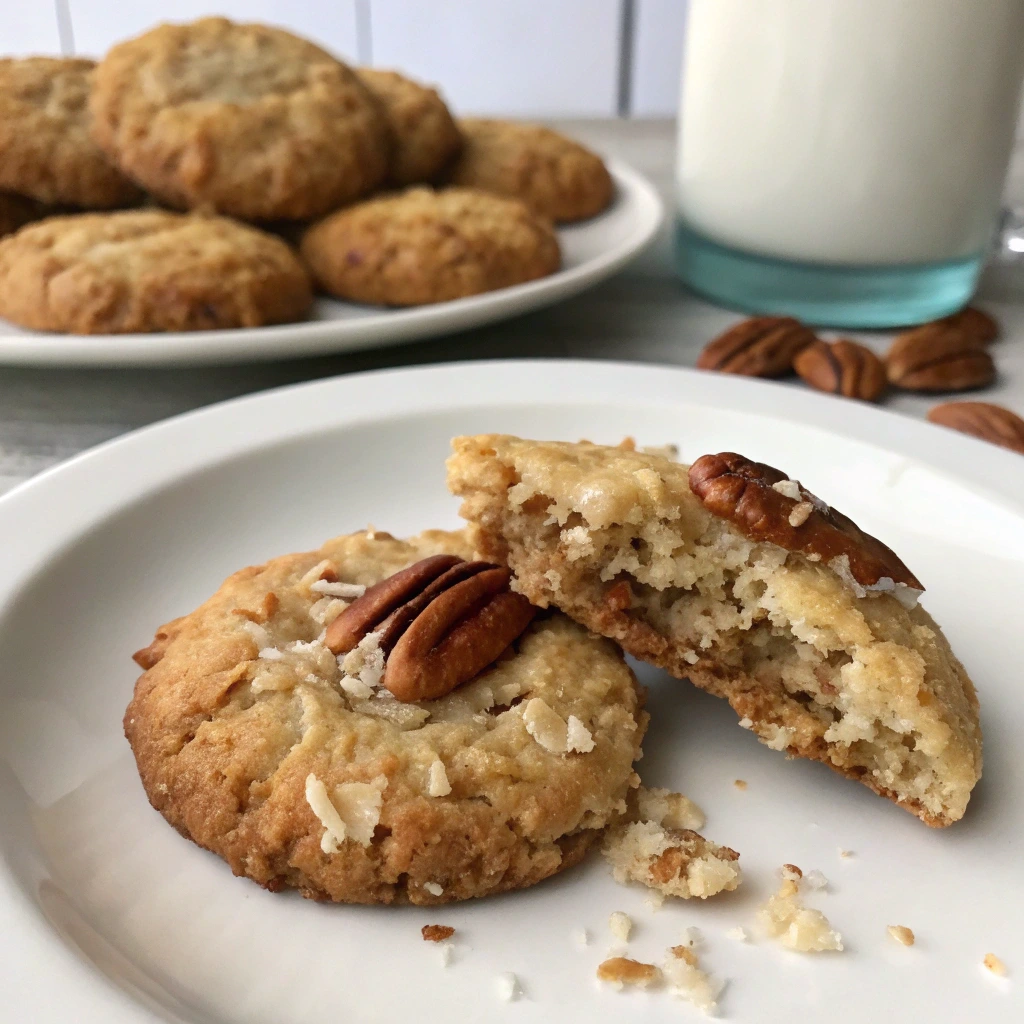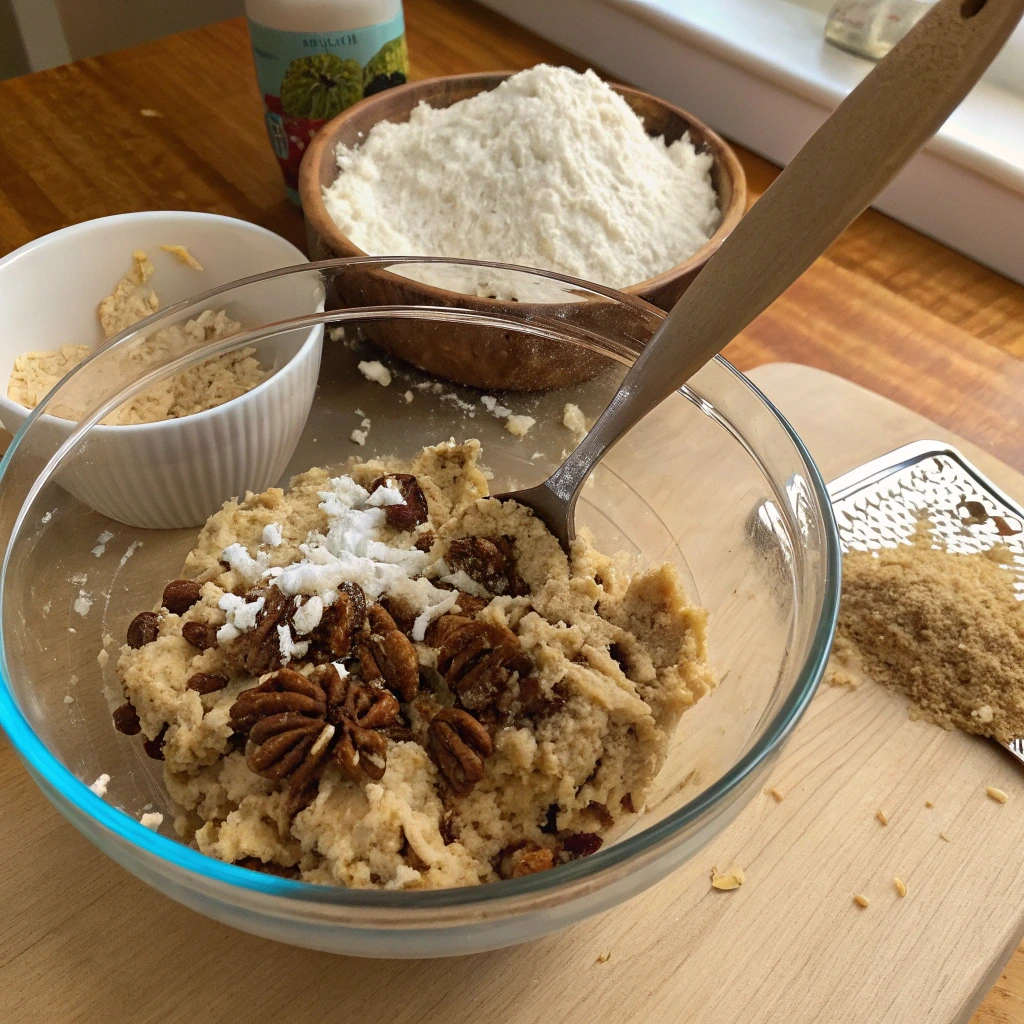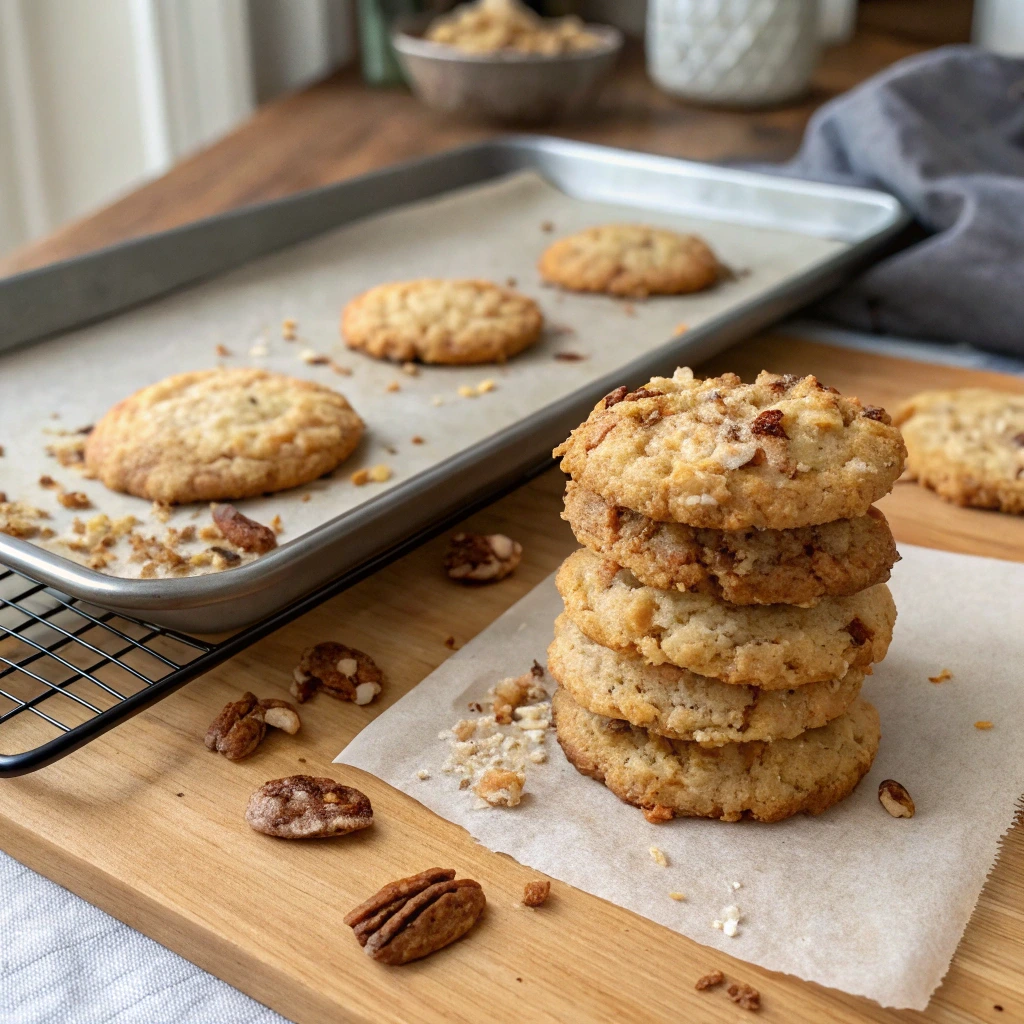What Are Coconut Pecan Cookies?
Coconut pecan cookies are delightful treats that blend the mild sweetness of coconut with the crunchy, nutty flavor of pecans. Their unique texture—both chewy and crisp—makes them a standout on any cookie tray.
From school bake sales to holiday parties, these cookies consistently steal the show thanks to their satisfying bite and sweet aroma.
A Brief History of Coconut & Pecan in Baking
Coconut has been used in desserts for centuries, especially in tropical areas where coconut trees abound. Pecans, native to North America, are beloved for their buttery taste. Combining these two in a cookie dough likely emerged naturally when creative bakers realized how coconut’s moisture and pecans’ crunch complement each other.
Why Coconut & Pecans Make the Perfect Cookie Duo
- Flavor Harmony: Sweet coconut balances out the slightly oily pecan taste.
- Contrasting Textures: Chewy coconut flakes pair beautifully with crunchy pecans.
- Universal Appeal: Even picky eaters often appreciate this sweet-nut combo.
Popular Variations of Coconut Pecan Cookies
- Chocolate Chip Coconut Pecan Cookies – Add semi-sweet morsels.
- Oatmeal Coconut Pecan Cookies – Infuse dough with rolled oats.
- Coconut Pecan Cookie Bars – Press the dough into a pan, bake, and slice.

Ingredients Breakdown – What You Need for the Best Coconut Pecan Cookies
Choosing the Right Type of Coconut (Sweetened vs Unsweetened, Shredded vs Flakes)
- Sweetened Coconut: Delivers a sweeter dough but can mask some flavors if overly sweet.
- Unsweetened Coconut: Lets natural coconut taste shine, beneficial if you prefer controlling sugar levels.
- Shredded vs. Flaked: Shredded tends to blend better, while flaked offers extra texture.
How to Pick the Best Pecans for Extra Crunch
- Freshness: Sniff for any rancid notes. Old nuts ruin cookie flavor.
- Toasting: A light toast intensifies pecan aroma.
Butter, Sugar, and Flour – Finding the Right Balance
- Butter: Real butter yields a more robust taste. If salted, adjust salt in the recipe.
- Sugar: A mix of brown and white sugar creates both moisture and crisp edges.
- Flour: All-purpose is standard, but you can experiment with partial whole wheat or almond flour.
Optional Add-ins: Chocolate Chips, Oats, or Caramel?
- Chocolate Chips: Sweetness meets the earthy nutty vibe.
- Oats: Additional chew factor.
- Caramel Bits: Soft caramel pockets in every bite.
Step-by-Step Instructions to Bake Perfect Coconut Pecan Cookies
Prepping the Dough – Tips for the Right Texture
- Cream Butter & Sugar: Blend softened butter, brown sugar, and white sugar until fluffy.
- Add Eggs & Vanilla: Ensures a smooth dough, distributing flavors evenly.
- Combine Dry Ingredients Separately: Flour, baking soda, salt. Then add them gradually.
- Fold in Coconut & Pecans: Avoid overmixing to keep dough airy.
Chilling vs No-Chill – Which Works Best?
- Chilling: Ideal if you prefer thicker cookies with less spread.
- No-Chill: Speeds up the process, though cookies may be slightly flatter.
Baking Time & Temperature for Soft vs Crunchy Cookies
- Standard: 350°F (175°C) for ~10–12 minutes typically yields a lightly crisp edge.
- Soft & Chewy: Slightly underbake (8–9 minutes), resting cookies on a hot sheet for carryover cooking.
- Crispy: Extend time to ~13–14 minutes, monitoring for brown edges.
Storing Cookie Dough for Later Use
Roll dough into balls, freeze on a tray, then store in freezer-safe bags. That way, you can bake a few coconut pecan cookies whenever cravings strike.

Recipe Variations – Make Your Coconut Pecan Cookies Unique
Gluten-Free Coconut Pecan Cookies
Swap out regular flour with a 1:1 gluten-free baking mix. Xanthan gum or psyllium husk might help maintain structure.
Vegan-Friendly Coconut Pecan Cookies
Use vegan butter and a flax egg (1 tbsp ground flax + 3 tbsp water per egg). The result? Similar taste, minus animal products.
Low-Sugar or Keto Coconut Pecan Cookies
Try almond or coconut flour, plus sugar-free sweeteners like erythritol or monk fruit. Balance flavor carefully—sugar substitutes can alter texture.
Coconut Pecan Cookie Bars for a Quick Treat
Press your dough into a baking pan instead of scooping individual cookies. Bake slightly longer (~20–25 minutes at 350°F) until golden.
Tips & Tricks for Making the Best Coconut Pecan Cookies
Why Toasting Pecans Can Elevate the Flavor
Toss pecans on a sheet and toast at 350°F for ~5–7 minutes. Stir halfway. This step unlocks deeper nutty profiles and banishes any stale notes.
Secret Ingredient for Extra Soft Cookies
In some cases, adding 1 tsp cornstarch to the dry mix can yield softer cookies. Another approach is to slightly underbake and let them rest.
How to Prevent Cookies from Spreading Too Much
- Chill the Dough: At least 30 minutes. Cold dough spreads less.
- Use Parchment: Minimizes friction and ensures consistent spread.
- Measure Ingredients Accurately: Too much butter or sugar can cause over-spreading.
Serving Suggestions – Pairing Coconut Pecan Cookies with Beverages
The Best Coffee & Tea Pairings
- Light Roast Coffee: A mild brew accentuates the sweet coconut.
- Earl Grey Tea: Floral notes that harmonize with sweet-nutty cookies.
Coconut Pecan Cookies & Ice Cream – A Winning Combo
Crumble cookies atop vanilla or coffee ice cream. The crunchy bits offset the creamy base. You can even craft ice cream sandwiches using two large cookies.
Turning Your Cookies into a Dessert Board
Arrange coconut pecan cookies with mini pies or brownies. Add fresh fruit or cheese if you’re feeling adventurous. A drizzle of caramel sauce on the side is always welcomed.

Storing & Freezing Coconut Pecan Cookies
How to Keep Them Fresh for Days
Place cooled cookies in an airtight container, layering parchment between them. Keep at room temp ~5 days. A small slice of bread in the container helps retain moisture.
Freezing Baked vs Unbaked Cookie Dough
- Baked Cookies: Cool fully, store in freezer bags up to 2–3 months. Thaw at room temp.
- Dough Balls: Freeze on trays, then bag them. Bake from frozen, adding ~1–2 minutes.
Reheating for That Freshly Baked Taste
A quick 5-minute warm-up in a 300°F (150°C) oven revitalizes them. Microwaving can make them too soft, but 10 seconds is usually fine if you prefer a more tender bite.
FAQs About Coconut Pecan Cookies
Are coconut pecan cookies gluten-free?
Not inherently, but you can use GF flour blends.
Can I use a different nut instead of pecans?
Sure—walnuts or almonds may work, though flavor changes.
Why do my cookies turn out dry and crumbly?
You might be overbaking or adding too much flour. Adjust your baking time or wet-to-dry ratio.
What’s the best way to toast pecans for baking?
Spread them on a baking sheet at 350°F for ~5–7 minutes, stirring once.
Can I make these cookies without eggs?
Yes, a flax egg or applesauce can stand in. The texture might vary slightly.
What’s the best sugar substitute for a healthier version?
Coconut sugar or monk fruit sweeteners can work, but expect a subtle taste change.
Final Thoughts
Coconut pecan cookies combine sweet coconut with crunchy pecans for a cookie that stands out from the crowd.
With flexible recipes—gluten-free, vegan, or low-sugar—it’s easy to tailor them to your dietary needs. A batch of these sweet-nutty confections can brighten a dull afternoon, serve as a potluck hit, or stand proud in a holiday cookie swap.
Experiment with toasting nuts or adding chocolate chips, and watch how these unassuming cookies transform into a showstopper. For more creative snack ideas, check out our guide on pretzel sticks.
So gather your ingredients, fire up the oven, and let your next cookie session revolve around the delightful combination of coconut and pecans!

